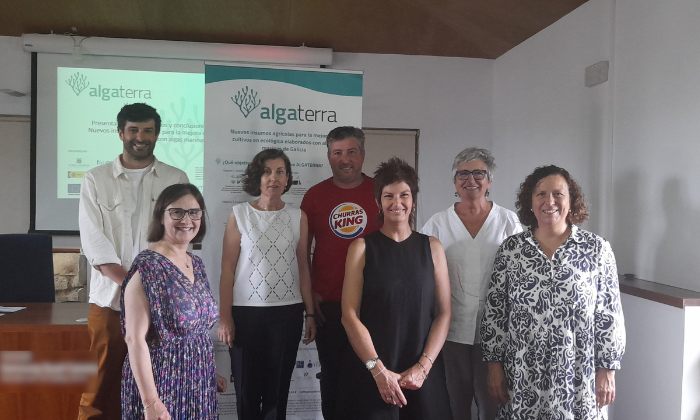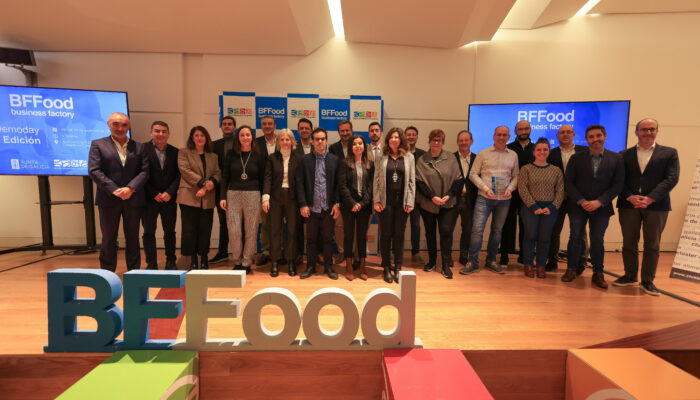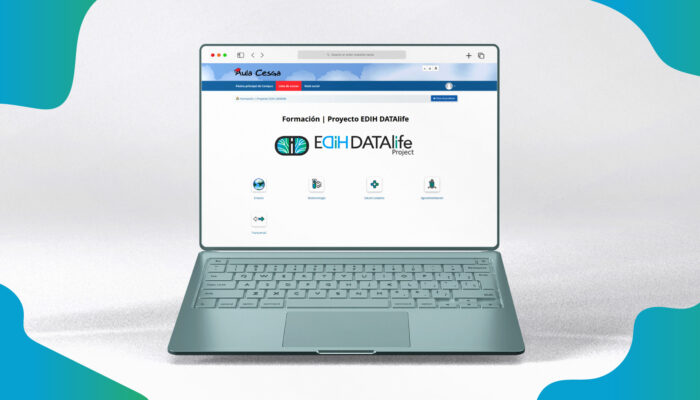
On Tuesday, July 4, ALGATERRA presented the activities developed and their main results, as well as the final conclusions of the innovation project, in which we participated, in a conference that took place at the facilities of the Misión Biolóxica de Galicia in Salcedo, Pontevedra.
ALGATERRA is a pilot project whose main objective is to develop new agricultural inputs with seaweed discards produced in the food industry, and to test their effectiveness for use in organic agriculture, as well as in conversion and sustainable conventional agriculture.
Manuel López Luaces, Head of the Training, Innovation and Agricultural Research Area of the Galician Food Quality Agency (AGACAL) began the event by explaining to the attendees the objectives of the new CAP 2023-2027 and the instruments and initiatives in which the Agency is working to promote innovation in the rural environment in Galicia, as well as the importance of Agricultural Knowledge and Innovation Systems (AKIS) for the transfer of knowledge in agriculture, stressing the importance of joining and imitating the steps taken by other European countries.
Manuela Buján, head of R&D at Porto Muiños, explained the process for the collection, classification, storage and treatment of algae discards and their subsequent production of fertilizers, emphasizing that the formulations and the calculation of the dosage were made according to the nutritional needs of the crop, the results of the soil analysis and the nutritional characteristics of the algae. He also explained how algae extracts were produced at laboratory and pilot scale to be applied to each crop and how induced growth tests were carried out to determine the range of activity and toxicity of the extracts, as well as tests to find the optimum doses.
The algae prepared in their different formats (as dehydrated fertilizer, as a component of growing substrate and as an extract) were tested in potato, lettuce, tomato and vine planting fields, as later reported by Elvira López Mosquera, from the Agronomy Group of the University of Santiago de Compostela (USC) and Mª del Carmen Martínez Rodríguez, Head of the Viticulture, Olive and Rose Group (VIOR) of the Biological Mission of Galicia (CSIC).
In addition to confirming the value of marine macroalgae as a fertilizer (thanks to their appreciable nitrogen and potassium content), the improvement of physical properties in substrates has been proven. Significant results have also been observed in the application of algae as biostimulants, which when applied strengthen the immune system of plants, increase tolerance to biotic (diseases and pests) and abiotic (drought, salinity, heat, cold) stresses and improve nutrient absorption.
The tests carried out through foliar application of the extracts are giving significantly positive and very promising results in the development of crops, such as, for example, the 74% increase in the weight of commercial potato production or the 37% increase in the weight of commercial lettuce, with respect to the control plots where the algae extracts formulated in Portomuiños were not applied.
Although many tests remain to be done, the results are very encouraging, algae extracts are also confirming their potential as a protective and/or preventive agent against fungal diseases of grapevine.
ALGATERRA is presented, therefore, as a viable alternative to respond to the demand of farmers in organic farming systems, making the activity around the Galician seaweed industry more environmentally, socially and economically sustainable, within the framework of a green and circular economy.
ALGATERRA is funded by the call for grants to support pilot projects, development of new products, practices, processes and technologies in the agroforestry field, co-financed with the European Agricultural Fund for Rural Development (EAFRD), under the Rural Development Program (RDP) of Galicia 2014-2020. The Consellería do Medio Rural is the body of the Galician Administration responsible for proposing and executing the general guidelines in the rural area and is responsible for agriculture, livestock, rural development and regional planning, rural structures, agri-food and forestry industries, forestry and forest fire prevention and defense.
Total budget: 182,964.40 €. Grant: 146,371.52 €. EU co-financing: 75% Feader.




